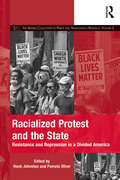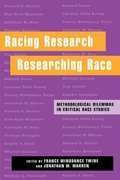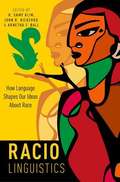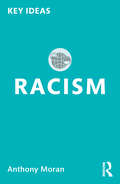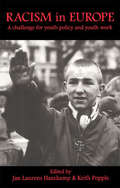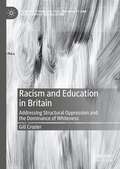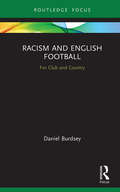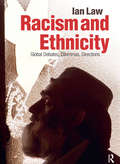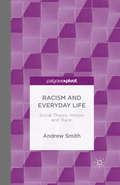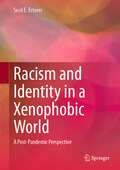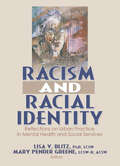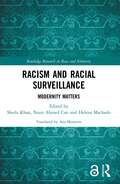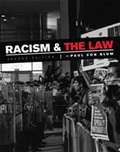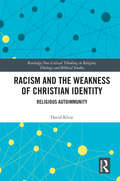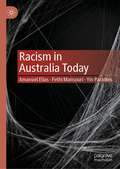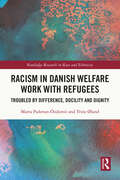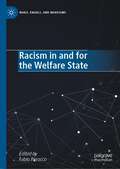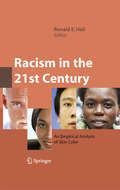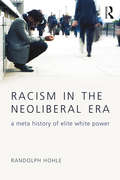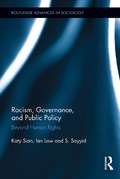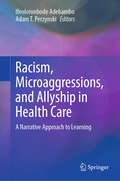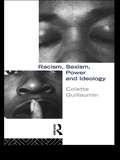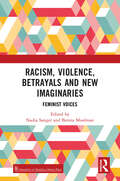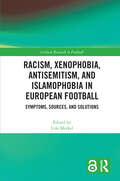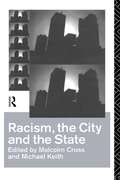- Table View
- List View
Racialized Protest and the State: Resistance and Repression in a Divided America (The Mobilization Series on Social Movements, Protest, and Culture)
by Hank JohnstonBringing together leading scholars of social movements and protest, this volume offers an up-to-date overview of several of the key ethnic and racial movements in the contemporary United States. The organizations, strategies, and challenges of the Black Lives movement, mainstream Black organizations, the Mexican-American Dreamer groups, immigrant-rights mobilizations, Arab-American resistance, and White nationalism are all examined by situating them in a rapidly evolving and—in many ways—increasingly unfavorable state context. With empirical studies linked by their dialogue with theories of social movement and protest, and, in particular, recent trends that emphasize the dynamic relations among social movement groups and organizations, Racialized Protest and the State also considers the multiciplicity of state players and the roles of hostile civic actors who oppose the movements' challenges. A cutting-edge analysis of an increasingly important dimension of contentious politics in complex and diverse Western societies, this book will appeal to scholars of sociology and politics with interests in social movements, nonviolent resistance, protest campaigns, and ethnic mobilization.
Racing Research, Researching Race: Methodological Dilemmas in Critical Race Studies
by Jonathan Warren France Winddance TwineAt a time when historians are reaching for new approaches to understanding the hidden life of working-class European families, this study of family life and work explores some of social history's most pressing questions in a compelling and lucid way. --Leslie Page MochUniversity of Michigan, Flint As the industrial revolution swept through towns and villages, it radically altered traditional ways of life, dramatically transforming the family unit. The greater economic and social role of women, the changing relationship between parents and children, and the decline of masculine power all played a role in the perceived crisis of the family. Increases in crime, infanticide, abortion, poverty, and the use of birth control all heightened the concern about the destruction of the family. By the late nineteenth century, communities throughout Europe and the United States witnessed a deliberate limitation of family size. This fall in family size resulted, Karl Ittman argues, not from newfound prosperity or the universality of Victorian values, but rather from the need for families to protect themselves from the uncertainties of modern life. This uncoupling of sexuality and reproduction sent shock waves through western societies that still resonate today. Many of these same issues have appeared in the contemporary American debate over family values. Focusing on West Yorkshire, England, in the latter half of the 19th century, Ittman illuminates the many social, personal, and familial crises brought on by the industrial revolution.
Raciolinguistics: How Language Shapes Our Ideas About Race
by Arnetha F. Ball John R. Rickford H. Samy AlimRaciolinguistics reveals the central role that language plays in shaping our ideas about race and vice versa. The book brings together a team of leading scholars-working both within and beyond the United States-to share powerful, much-needed research that helps us understand the increasingly vexed relationships between race, ethnicity, and language in our rapidly changing world. Combining the innovative, cutting-edge approaches of race and ethnic studies with fine-grained linguistic analyses, authors cover a wide range of topics including the struggle over the very term "African American," the racialized language education debates within the increasing number of "majority-minority" immigrant communities in the U.S., the dangers of multicultural education in a Europe that is struggling to meet the needs of new migrants, and the sociopolitical and cultural meanings of linguistic styles used in Brazilian favelas, South African townships, Mexican and Puerto Rican barrios in Chicago, and Korean American "cram schools" in New York City, among other sites. <P><P>Taking into account rapidly changing demographics in the U.S and shifting cultural and media trends across the globe--from Hip Hop cultures, to transnational Mexican popular and street cultures, to Israeli reality TV, to new immigration trends across Africa and Europe--Raciolinguistics shapes the future of scholarship on race, ethnicity, and language. By taking a comparative look across a diverse range of language and literacy contexts, the volume seeks not only to set the research agenda in this burgeoning area of study, but also to help resolve pressing educational and political problems in some of the most contested raciolinguistic contexts in the world. <P><P>Taking into account rapidly changing demographics in the U.S and shifting cultural and media trends across the globe--from Hip Hop cultures, to transnational Mexican popular and street cultures, to Israeli reality TV, to new immigration trends across Africa and Europe--Raciolinguistics shapes the future of scholarship on race, ethnicity, and language. By taking a comparative look across a diverse range of language and literacy contexts, the volume seeks not only to set the research agenda in this burgeoning area of study, but also to help resolve pressing educational and political problems in some of the most contested raciolinguistic contexts in the world.
Racism (Key Ideas)
by Anthony MoranRacism has a long history and its devastating impacts continue to spark heated, moral and political debate and give rise to social movements and widespread protest. This accessible primer provides a cogent introduction to the study and confrontation of racism in the twenty-first century, making use of key insights from sociology and other social sciences. Drawing on a range of scholars, including from the radical black tradition and the Global South, this book explores key issues in racism studies. Putting racism into historical context, Moran explains the modernity of racism and its creation through European colonialism and imperialism, racial capitalism, and the development of racist hierarchies stimulated by colonialist exploitation as well as pseudoscientific and Enlightenment thinking centred upon white supremacy. Moran also discusses the intersectional, structural, institutional and systemic nature of racism, and the connections between race, racism and nationalism evident in the explosion of right-wing nationalist populism around the world. The book also investigates how the self and subjectivity are involved in racism and contribute to the reproduction of racism as a system, before considering whether there are new, cultural forms of racism, and how we can account for Islamophobia and other racisms described as new, such as colour-blind racism, post-racial racism and racism without racists. Crucially, the book explores anti-racist social movements (such as Black Lives Matter) and how racism has been challenged, and discusses how accounts of race and racism can be given without reproducing the category of race as a ‘natural’ organiser of people, groups, and identities. This book will appeal to the general reader and students in the humanities and social sciences with an interest in the continuing impact of racism, racial identities, migration, multiculturalism, ethnic and racial studies, nationalism and identity studies.
Racism In Europe: The Challenge For Youth Policy And Youth Work
by Jan Laurens HazekampThis accessible text provides a comparative perspective on racism in Europe as experienced and exhibited by young people. It offers a clear analysis of the causes of racism and nationalism and examines public policies designed to have a positive effect.; This book is intended as a supplementary text for undergraduate and postgraduate students in social work, social policy, sociology and political science, and as an essential text for students on professional courses in youth and community work.
Racism and Education in Britain: Addressing Structural Oppression and the Dominance of Whiteness (Palgrave Studies in Race, Inequality and Social Justice in Education)
by Gill CrozierThis book is concerned with racism and education in Britain. It aims to seek greater understanding of the nature and endurance of racism within education practice in the 21st century and to examine the relationship between racism and the educational experiences and outcomes of many Black, Asian and Minority Ethnic (BAME) children and young people, with reference to school and university. Employing Critical Race Theory, Critical Whiteness Theory and Intersectionality, this structural analysis traces the historical and contemporary development of racism in education. White privilege and White supremacy, it is argued, are central to the perpetuation of racism and the failure to either understand or recognise the systemic nature of racial oppression. The book focuses on Britain, but the analysis locates racism as a global phenomenon. In spite of decades of policies on ‘race’ equality in Britain, BAME children and young people continue to be discriminated against and are failed by the education system. Applying a theoretical analysis of racism and White supremacy and privilege to an examination of government policies and research in schools and universities, the nature and extent of racism is revealed in the educational experiences of young people.
Racism and English Football: For Club and Country (Routledge Focus on Sport, Culture and Society)
by Daniel BurdseyRacism and English Football: For Club and Country analyses the contemporary manifestations, outcomes and implications of the fractious relationship between English professional football and race. Racism, we were told, had disappeared from English football. It was relegated to a distant past, and displaced onto other European countries. When its appearance could not be denied, it was said to have reappeared. This book reveals that this was not true. Racism did not go away and did not return. It was here all along. The book argues that racism is firmly embedded and historically rooted in the game’s structures, cultures and institutions, and operates as a form of systemic discrimination. It addresses the ways that racism has tainted English football, and the manner in which football has, in turn, influenced racial meanings and formations in wider society. Equally, it explores how football has facilitated forms of occupational multiculture, black player activism and progressive fan politics that resist divisive social phenomena and offer a degree of hope for an alternative future. Focusing on a diverse range of topics, in men’s and women’s football, at club and international level, Racism and English Football extends and expands our knowledge of how racism occurs and, critically, how it can be challenged. This is an essential read for scholars and students working on race, ethnicity, sport and popular culture, together with those interested in the social and organisational dynamics of English professional football more generally.
Racism and Ethnicity: Global Debates, Dilemmas, Directions
by Ian LawRacism and Ethnicity: Global Debates, Dilemmas, Directions examines in detail the theories, histories and principal debates of race, racism and ethnicity within a global context. The text offers critical evaluation of the work of major figures from Du Bois to Goldberg, and presents new research on pre-modern racisms, contemporary scientific racisms, racist violence, racism reduction, ethnicity in the UK and European patterns of exclusion and discrimination. Richly illustrated throughout with examples and case studies drawn from across the world and time, the book also offers a range of in-text features to aid study, including: chapter summaries, key concept boxes, chapter activities and further reading.Racism and Ethnicity: Global Debates, Dilemmas, Directions will be core reading for students at all levels across the social sciences and the humanities ranging from history and cultural studies through sociology to political and policy analysis. It will also be of significant interest to researchers and policy makers in a range of fields.
Racism and Everyday Life: Social Theory, History and 'Race'
by Andrew SmithWhat does it mean to talk about everyday racism, and why should we do so? Racism and Everyday Life brings together the sociologies of racism and everyday life in a new way in order to reflect on these questions. Smith argues that racism and everyday life are not just 'act' and 'context' respectively, but rather they are part of the making of each other. Using a variety of historical and contemporary examples, this book draws on the pioneering insights of W.E.B. Du Bois and other writers in order to explore the interwoven relationship between racism and the everyday.
Racism and Identity in a Xenophobic World: A Post-Pandemic Perspective
by Secil E. ErtorerThis book is written against the backdrop of heightened racism and xenophobia in the contemporary world. It elucidates how ‘race’ operates in racially and ethnically diverse societies and becomes a divisive force. The book offers an interdisciplinary, multi-level model for understanding the roots of racial prejudice and hatred towards the 'other' by incorporating individual, group, institutional, and societal factors. Moreover, it elaborates on the negative effects of racism on the identity and psychological well-being of individuals and proposes strategies to counteract these issues. An empirical study conducted with Asian American and Pacific Islander communities during the COVID-19 pandemic demonstrates the practical application of the theory. The significant increase in anti-Asian racism from 2020 to 2022 illustrates how easily xenophobia and racism can be triggered during times of rapid change, instability, and uncertainty. While the primary focus is on the USA, the study's findings are relevant to multiracial societies globally. This book is intended for researchers and students of interdisciplinary social sciences interested in inequality, racism, and othering, as well as those studying the Asian diaspora. It is also of wider interest to anyone, especially practitioners, seeking to understand and dismantle the problem of heightened 'othering' and racism.
Racism and Racial Identity: Reflections on Urban Practice in Mental Health and Social Services
by Lisa V. BlitzFirst published in 2006. Routledge is an imprint of Taylor & Francis, an informa company.
Racism and Racial Surveillance: Modernity Matters (Routledge Research in Race and Ethnicity)
by Helena Machado Sheila Khan Nazir Ahmed Can Ana MonteiroBased on the premise that the project of Western Modernity is a structuring element of our societies, Racism and Racial Surveillance explores in detail its legacies of coloniality and racialization that interfere in a subtle and perverse way in the current social, cultural and political systems. Guided by an interdisciplinary methodology, the various contributions privilege historical contexts of colonial formation and offer a thorough and intersectional analysis on the specters of coloniality in the upsurge of racism, surveillance, and criminalization, as well as the presence of the phantom of the race in spaces of knowledge production such as that of artistic field, forensic genetics and criminal identification. Drawing on multi case studies the book then proffers key concepts and historical background that will be of interest to researchers, students and professionals in a broad range of areas of social sciences and humanities research, including fields such as criminology and policing, science and technology studies, arts studies, literary studies, race and ethnic studies and, finally, memory studies.
Racism and The Law
by Paul Von BlumRacism and the Law is a text and casebook that provides an introduction to the close and complex relationships between race and law, legal institutions, and legal personnel. It combines original text with primary source documents such as judicial decisions and statutory materials. Historical, political, and linguistic analyses of legal materials are provided throughout the text. The book deals with the major historical legal developments that have caused and reinforced discrimination against African Americans, Asians, and Latinos, and addresses the courageous efforts of civil rights lawyers and organizations working for racial justice and equality in America. The volume is intended for use in undergraduate studies in several fields, including political science, history, African American studies, public policy, sociology, and criminal justice. It includes a bibliography for readers who wish to explore the topics in greater depth and the concluding chapter features specific directions for prospective lawyers who hope to work for racial justice in the early 21st century.
Racism and the Weakness of Christian Identity: Religious Autoimmunity (Routledge New Critical Thinking in Religion, Theology and Biblical Studies)
by David KlineDespite the command from Christ to love your neighbour, Western Christianity has continued to be afflicted by the evil of racism and the acts of violence that accompany it. Through a systems theoretical and deconstructive account of religion and the political theology of St. Paul, this book traces how the racism and violence of modern Western Christianity is a symptom of its failure to secure its own myth of sovereignty within a complex world of plurality. Divided into three sections, the book begins with a philosophical and critical account of what it calls the immune system of Christian identity. Focusing on Pauline political theology as reflective of an inherent religious "autoimmunity" built into Christian community, a theory of theological-political violence is located within Western Christianity. The second section traces major theoretical aspects of the historical "apparatus" of Christian Identity. It demonstrates that it is ultimately around the figure of the black slave that racialized Christian identity becomes a system of anti-blackness and white supremacy. The book concludes by offering strategies for thinking resistance against such racialised Christian identity. It does this by constructing a "pragmatics of faith" by engaging Deleuze’s and Guattari’s use of the term pragmatics, Moten’s theory of black fugitivity, and Long’s account of African American religious production. This wide-ranging and interdisciplinary view of Christianity’s relationship to racism will be of keen interest to scholars of Religious Studies, Theological Studies, Cultural Studies, Critical Race Studies, American Studies, and Critical Theory.
Racism in Australia Today
by Fethi Mansouri Yin Paradies Amanuel EliasThis book focuses on historical and current data to examine racism in Australia. Making use of the latest state and federal data sets, it critically synthesises contemporary research on race relations with a focus on racism and anti-racism initiatives. Employing innovative analytical methods, the book provides students and researchers with a current and up-to-date analytical framework, and benchmark empirical evidence on race relations. In addition, the book also analyses research data from other countries in order to generate some comparative insights and draw possible lessons and policy implications for Australia.
Racism in Danish Welfare Work with Refugees: Troubled by Difference, Docility and Dignity (Routledge Research in Race and Ethnicity)
by Trine Øland Marta Padovan-ÖzdemirThis book explores contemporary Danish relations of colonial complicity in welfare work with newly arrived refugees (1978-2016) as recursive histories that reveal new shapes and shades of racism. Focussing on super- and subordination in helping relations of postcoloniality, the book displays the durability of coloniality and the workings of raceless racism in welfare work with refugees. Its main contribution is the excavation of stock stories of colour-blindness, potentialising and compassion, which help welfare workers invest in burying that which keeps haunting welfare work with refugees, i.e., modern ghosts of difference, docility and dignity. The book dismantles the global myth of the Danish benevolent, universalistic welfare state and it is of interest to every scholar and student, who wants to make inquiries about Danish exceptionalism and the hidden interaction between past and present, the visible and invisible in Danish welfare work with refugees.
Racism in and for the Welfare State (Marx, Engels, and Marxisms)
by Fabio PeroccoThis book analyses politics, practices, and discourses of welfare racism against immigrants under neoliberalism. As an instrument of selection, exclusion, exploitation, and stigmatisation, welfare racism is a distinguishing feature of anti-immigrant racism which has gained new momentum over the last decades. The strength and persistence of this form of racism are linked to several factors, including the colonial roots of the welfare state, racism’s structural position in modern society, the intrinsic limits of social rights in capitalism, and migration policies that are almost always punitive in nature. Rich in documents and historical perspective, this book presents a global analysis of racism within and in the name of the welfare state. It examines discriminatory laws, measures, and practices by state actors and discourses by public figures and organizations, demonstrating the ways these developments are related to the dismantling of the welfare state in the neoliberal era, and to the war on labour and social rights. Integrating perspectives from Belgium, Brazil, Germany, Hungary, Israel, Italy, Japan, Spain, Sweden, the United Kingdom, and the United States, Perocco highlights welfare racism as a global and structured phenomenon producing inequalities and concerning labour as a whole.
Racism in the 21st Century
by Ronald E. HallIn the post-Civil Rights era, there is a temptation to assume that racism is no longer the pressing social concern in the United States that it once was. The contributors show that racism has not fallen from the forefront of American society, but is manifest in a different way. According to the authors in this volume, in 21st century, skin color has come to replace race as an important cause of discrimination. This is evidenced in the increasing usage of the term "people of color" to encompass people of a variety of racial and ethnic backgrounds. The editor has compiled a diverse group of contributors to examine racism from an interdisciplinary perspective. Contributions range from the science of racism, from its perceived biological basis at the end of the 19th century, to sociological studies its new forms in the 21st century. The result is a work that will be invaluable to understanding the challenges of confronting Racism in the 21st Century.
Racism in the Neoliberal Era: A Meta History of Elite White Power (New Critical Viewpoints on Society)
by Randolph Hohle<p>Racism in the Neoliberal Era explains how simple racial binaries like black/white are no longer sufficient to explain the persistence of racism, capitalism, and elite white power. The neoliberal era features the largest black middle class in US history and extreme racial marginalization. Hohle focuses on how the origins and expansion of neoliberalism depended on language or semiotic assemblage of white-private and black public. <p>The language of neoliberalism explains how the white racial frame operates like a web of racial meanings that connect social groups with economic policy, geography, and police brutality. When America was racially segregated, elites consented to political pressure to develop and fund white-public institutions. The black civil rights movement eliminated legal barriers that prevented racial integration. In response to black civic inclusion, elite whites used a language of white-private/black-public to deregulate the Voting Rights Act and banking. They privatized neighborhoods, schools, and social welfare, creating markets around poverty. They oversaw the mass incarceration and systemic police brutality against people of color. Citizenship was recast as a privilege instead of a right. Neoliberalism is the result of the latest elite white strategy to maintain political and economic power.</p>
Racism, Governance, and Public Policy: Beyond Human Rights (Routledge Advances in Sociology #112)
by Ian Law S. Sayyid Katy SianThis book presents a new framing of policy debates on the question of racism through a discursive critique of contemporary issues and contexts, drawing on a program of new European research carried out between 2010 and 2013, with a central focus on the UK. This includes analysis of the discursive construction of Muslims in three contexts: the workplace, education and the media. Informed by a fundamental critique of both the "post-racial" and the limitations of human rights strategies, it identifies the ongoing significance of contemporary raciality in governance strategies and develops a new radical agenda for addressing these processes, advocating strategies of "racism reduction."
Racism, Microaggressions, and Allyship in Health Care: A Narrative Approach to Learning
by Ifeolorunbode Adebambo Adam T. PerzynskiThis book provides a complete teaching companion that an organization can use to educate on the hard topics of racism, antiracism, microaggressions, bias and allyships. It explores the experience of underrepresented minority trainees and other healthcare professionals with racism and allyship. Talking about racism is challenging due to the amount of associated pain, suffering and strong emotions. Creating a respectful, open, interactive and safe place to have conversations, teach and learn is paramount in order to produce change in the healthcare environment. Using narratives to facilitate difficult conversations is familiar to healthcare professionals, and with humility reminds us that we are all "patients" that also need healing. Narratives promote self-reflection and have the power to change beliefs and attitudes. The volume opens with introductory chapters that focus on definitions, historical context and the current climate of racism, bias, microaggressions and allyship. Narratives are presented in 42 chapters organized by themes of racism, microaggression, allyship, sexism and health equity. Each narrative is an honest representation of real-life encounters within the healthcare system. The narratives include personal experiences of racism in health care, explicit and implicit bias, microaggressions and experiences of anti-racist efforts and allyship. There are clear instructions on how to use the narratives for teaching and to facilitate discussion. Among the book's benefits: Explicitly includes the perspective of trainees and administration; Engages learners in affective and emotional learning as well as practical and cognitive learning modes; Provides a series of historical cases, consistent with the preferred and traditional learning modality of health professions; Includes an array of activities, tools and learning exercises. Racism, Microaggressions and Allyship in Health Care is a timely and essential text for medical student and resident training, graduate and undergraduate nursing programs, advanced practice care providers, clinical faculty and staff development, CME workshops, public health programs, and hospital administration. It also is a useful resource for undergraduate pre-medicine programs, structural racism courses, and advanced social science courses (health disparities, medical sociology, inequality, healthcare policy).
Racism, Sexism, Power and Ideology (Critical Studies in Racism and Migration)
by Colette GuillauminFirst Published in 2004. Routledge is an imprint of Taylor & Francis, an informa company.
Racism, Violence, Betrayals and New Imaginaries: Feminist Voices
by Nadia Sanger Benita MoolmanThis anthology consists of academic essays, creative non-fiction, poetry and short stories on race and racism by black women from South Africa and Brazil. Through these different genres, the book engages with the complexities of race in social, political, economic, institutional and personal spaces. Concerned with social justice, human rights and freedom, these writings spotlight the amalgamation of racial, gender and class subjectivities and how these are marked, un-marked, re-marked and re-made on bodies. The book connects globally and locally to social and political phenomena in the modern-day world. The contributors interrogate their political and personal worlds, revealing layered, intersecting ways of being that were essentially centred by colonial histories but not defined in totality by coloniality and oppression. In speaking to the proximity of these experiences, they reflect and narrate the past, contemplate the present and imagine the future. This curated anthology asks questions centred around freedom. What does freedom mean? When do we have it, and when do we not? Most importantly, how do we get it? Print edition not for sale in Sub Saharan Africa.
Racism, Xenophobia, Antisemitism, and Islamophobia in European Football: Symptoms, Sources, and Solutions (Critical Research in Football)
by Udo MerkelThis book examines the prevalence of racism, xenophobia, antisemitism, and Islamophobia in European football. It provides critical assessments of selected policies, strategies, campaigns, and initiatives that have been developed by various stakeholders aimed at combating these discriminatory practices.Bringing together leading football researchers, this book opens with a discussion of the historical context for racism, xenophobia, antisemitism, and Islamophobia in European football and outlines the key terms and core concepts that frame the study of this topic. The book then offers ten in-depth case studies of European countries, including England, France, Germany, Italy, the Netherlands, Poland, Portugal, Scotland, Spain, and Sweden. Each chapter describes and analyses the various manifestations of racism, xenophobia, antisemitism, and/or Islamophobia against the specific socio-historical, demographic, political, and cultural contexts of the country before engaging with the responses of selected stakeholders. The case studies are followed by a critical account of supra-national responses, including the involvement of UEFA, the European Union, the Council of Europe, and Football Against Racism in Europe (FARE). The book is rounded off by a cross-cultural, comparative analysis drawing out the key themes that define the problem of racism and discrimination in European football today.The most up-to-date study of one of football’s most disconcerting and enduring issues, this book is fascinating reading for any student, researcher, policymaker, or practitioner with interest in the sociology of sport, football and its fan cultures, issues of inclusion and exclusion in modern societies, European football, and the relationships between sport and wider society.
Racism, the City and the State
by Malcolm Cross Michael KeithDoes the concept of ethnicity divide the oppressed or unite minorities? Is the term `community' a dangerous fiction? What are the relations between the liberal capitalist democratic state and racialized minority groups? The contributors to this book confront and discuss these questions, bringing together ideas on urban social theory, contemporary cultural change and analysis of racial surbordination in order to explore the relationship between racism, the city and the state. The book concentrates on the urban context of the process of racialization, demonstrating that the city provides the institutional framework for racial segregation, a key process whereby racialization has been reproduced and sustained. Individual chapters explore the profound divisions inscribed on the face of the city, showing for example that ethnicity is more powerful than social class in moulding the identities of new migrants to California, and that the reconstruction of French capitalism has opened new opportunities for the growth of right-wing popularism. The contributors show how, in the UK, urban space over the last two decades has been redefined and reconstructed in ways which sustain separation and racial inequality, and they highlight how black minorities struggling for survival in Britain's cities are seen as responsible for violence, crime, poverty and overcrowding.
